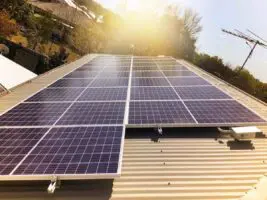
In the first quarter of 2016, 1,665 megawatts of solar PV were installed in the United States with the solar industry adding more new capacity during this period than coal, natural gas and nuclear combined.
According to GTM Research and the Solar Energy Industries Association’s (SEIA) U.S. Solar Market Insight, Q2 2016, the 1,665 megawatts accounted for 64 percent of all new electric generating capacity brought on-line in the first quarter of the year.
This growth builds off the momentum of a record 2015, in which solar exceeded natural-gas capacity additions on an annual basis for the first time ever. The report also says that this year the U.S. solar industry will install an unprecedented 14.5 gigawatts of capacity, a 94 percent jump over the 7.5 gigawatts in capacity installed in 2015. This growth cements solar energy’s role as a mainstay in America’s portfolio of electricity sources.

The first quarter of 2016 marks the tenth consecutive quarter in which more than a gigawatt of PV was installed in the United States, and the 12th consecutive quarter in which 500 megawatts or more of utility-scale PV was installed.
There are now more than a million operating solar PV installations across the country, representing 27.5 cumulative gigawatt of operating capacity.
“While it took us 40 years to hit 1 million U.S. solar installations, we’re expected to hit 2 million within the next two years,” said Tom Kimbis, SEIA’s interim president. “The solar industry is growing at warp speed, driven by the fact that solar is one of the lowest-cost options for electricity, and it’s being embraced by people who both care about the environment and want access to affordable and reliable electricity.”
Utility PV is expected to drive the majority of demand, accounting for nearly three-fourths of new capacity. More than 10 gigawatts of utility PV is slated to come on-line this year. At least another 4.5 gigawatts of utility PV installations are expected to be nearly or fully finished with construction in Q4 2016 and official commercial operation expected in 2017.
The non-residential solar market experienced some much needed consistency this past quarter. The report notes that for the first time ever, the non-residential market experienced back-to-back quarters with installations of 300 megawatts or more.
“Over the past six months, the non-residential PV segment has shown glimpses of a market that can grow across a more diverse set of project development opportunities,” said Cory Honeyman, GTM Research’s associate director of U.S. solar. “While a number of policy- and customer-driven bottlenecks continue to challenge the market, a handful of state policies established over the past half-year should unlock new customer-sited and offsite development, with Fortune 500 corporate customers playing a key role in supporting the market’s rebound.”
Despite some net-metering reform hurdles, the residential market segment continued its track record of quarterly growth, although at a much slower clip due to a typical seasonal dip during the late winter months. While California remained relatively flat, other markets picked up the slack. GTM Research points to New York and Maryland, which both experienced quarterly growth rates of 25 percent in residential.

With the recent extension of the federal Investment Tax Credit, a number of large-scale projects have breathing room to spill over into 2017. That spillover effect, plus a growing number of geographies where distributed and utility PV are attractive with an ITC extension, position U.S. solar to remain a double-digit-gigawatt annual market through the end of this decade.
For more information, download the report’s free executive summary here.










